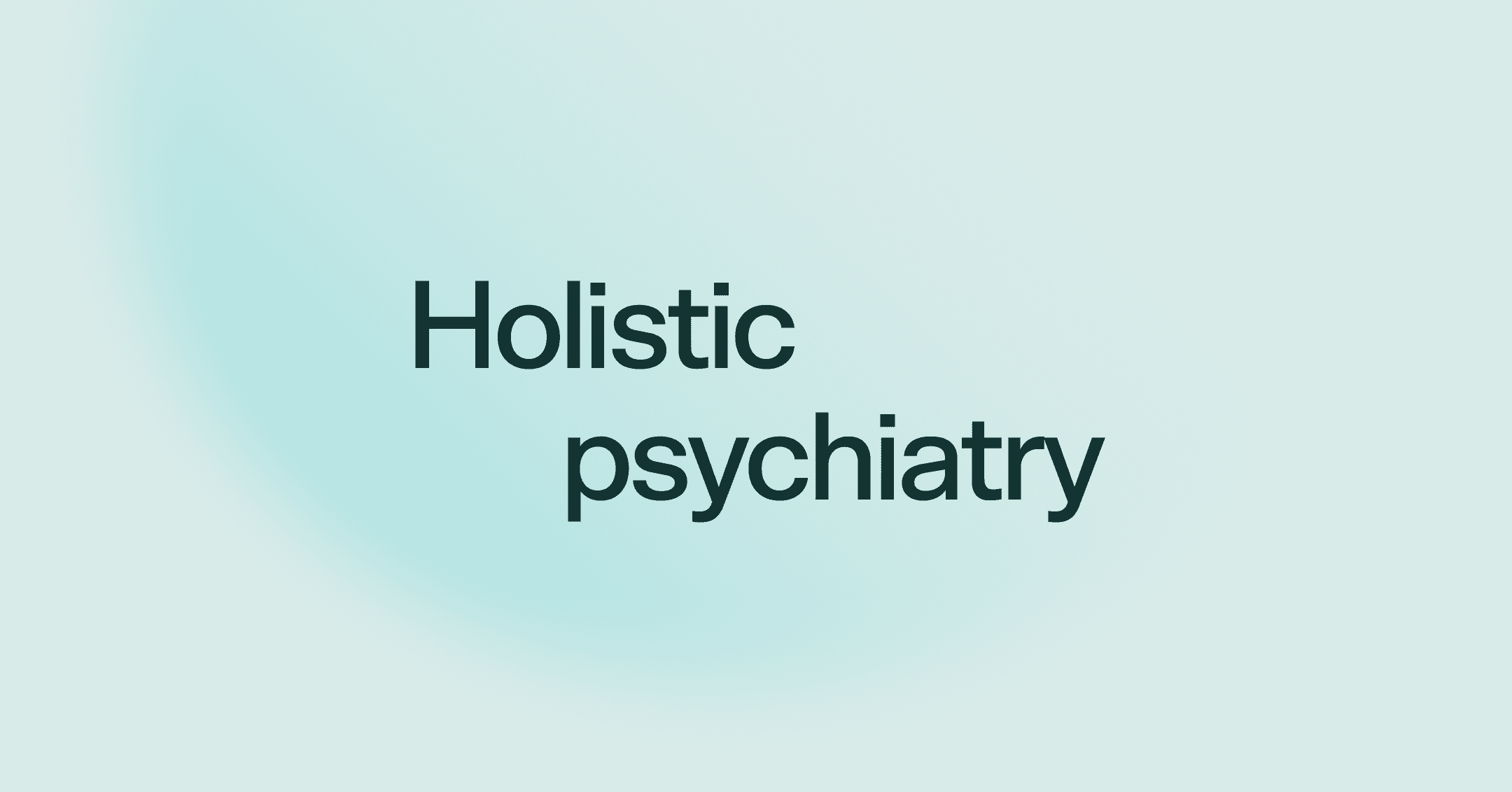Holistic psychiatry takes a “whole-person” approach to care, meaning it considers a person’s mental, emotional, physical, and spiritual well-being.
Holistic psychiatry is an umbrella term for psychiatric treatment that uses traditional methods, like medication management, and complementary therapies, like meditation, art therapy, and nutritional counseling.
A holistic approach to mental healthcare can be used to treat a range of mental and behavioral health conditions. Talk to your psychiatric provider if you’re interested in exploring this type of treatment.
Holistic psychiatry practices focus on the mind-body connection. They combine traditional psychiatric treatment with complementary therapies to support the whole person — meaning your mental, emotional, physical, and spiritual needs.
With a holistic approach, your provider will consider factors like your mental health symptoms, physical health, lifestyle habits, and personality traits to create a treatment plan that addresses the root cause of your concerns. If you’re looking for personalized care that goes beyond conventional medicine, consider exploring a more holistic approach to mental healthcare.
What is holistic psychiatry?
According to the American Holistic Health Association, holistic care can help people achieve mental, emotional, spiritual, and physical interconnectedness. Holistic psychiatry encourages people to be active participants in their health and healing journey and to make lifestyle choices that promote overall wellness.
Like with other types of psychiatric care, your provider will consider your symptoms, health history, and any current medications when creating your treatment plan. However, they’ll also adopt a wider lens to consider factors like early life experiences, stress-management skills, personal and spiritual beliefs, and lifestyle factors like diet, exercise, and sleep.
Proponents of holistic psychiatry believe this whole-person approach offers several mental health benefits, including:
Increased self awareness and emotional-regulation skills
Sustainable and healthy coping mechanisms
Greater mental, emotional, and physical health
Reduced need for medication management
Increased mental, emotional, spiritual, and physical balance
The care you need, when you need it
Learn how Rula can support your mental health journey
Popular types of holistic psychiatric care
Holistic psychiatry is an umbrella term for various psychiatric approaches that consider the mind-body connection. Holistic psychiatry tools and strategies might include:
Yoga, tai chi, and qigong
Psychotherapy
Art and music therapy
Acupuncture
Light therapy
Herbal medicines and/or dietary supplements
Body work
Aromatherapy
There are two notable approaches to holistic psychiatric care:
1. Integrative psychiatry
As a type of holistic care, integrative psychiatry focuses on treating the whole person — not just their symptoms or diagnosis. An integrative psychiatrist may ask about your relationship history, lifestyle habits, and biological and psychological risk factors to better understand the root causes of your mental health concerns. Integrative psychiatry typically combines medication management with methods like mindfulness and talk therapy.
2. Functional psychiatry
Functional psychiatry is another psychiatric approach that focuses on whole-person care. Psychiatrists who practice functional medicine will work with you to identify and manage the biological causes of your mental health challenges. In most cases, this will involve lab testing to learn more about your hormones, gut health, and any nutritional deficiencies.
In addition to medication management and talk therapy, functional psychiatry can include dietary supplements and exercise therapy.
Finding the right holistic psychiatrist for you
Holistic psychiatry can be helpful for mental and behavioral health conditions, like anxiety, depression, eating disorders, and substance use disorders. You may have success with a holistic approach to mental healthcare if you:
Have had limited success with medication alone, or you feel like your current treatment plan isn’t effectively meeting your needs
Have been experiencing both mental and physical health symptoms, like depression and chronic fatigue
Want to understand why you feel the way you do so you can achieve long-term healing and growth
Are open to making lifestyle changes, like diet, physical activity, and stress management
Holistic psychiatry emphasizes the importance of shared decision making. It encourages close collaboration between you and your psychiatrist so you feel empowered to make informed decisions about your health. Because of this, it’s important to find a provider you’re comfortable with and who has the right type of experience for your needs.
When choosing a psychiatrist who practices with a holistic approach, keep these questions in mind:
How long have they practiced holistic care?
What complementary therapies do they use in their practice?
How often is medication part of their treatment plans?
How do they collaborate with other healthcare professionals?
I have seen many people come in frustrated or demoralized because medications haven’t provided relief from their symptoms. If this is your experience, I recommend finding a provider who practices from a more holistic perspective — someone who will work with you to more closely examine and then address other factors that may be underlying or contributing to your condition.

Stephanie J Reed, MSW, MSN, PMHNP-BC
Clinical reviewer
Find care with Rula
Everyone has health challenges and concerns, and their mental healthcare should reflect that. With holistic psychiatry, you don't have to choose between medication and alternative methods. Your provider will consider mental, emotional, physical, and spiritual factors to help each person feel their best.
At Rula, we’re here to help you feel better. Rula makes it easy to find a licensed therapist or psychiatric provider who takes your insurance. That way, you don’t have to choose between great care and a price you can afford.
Rula patients pay about $15 per session with insurance, and 93% say they feel better after getting care through Rula. We have 21,000+ providers, and appointments are available as soon as tomorrow. We’re here to help you take the next step — wherever you are in your mental health journey.
Rula’s editorial process
Rula’s editorial team is on a mission to make science-backed mental health insights accessible and practical for every person seeking to better understand or improve mental wellness.
Members of Rula’s clinical leadership team and other expert providers contribute to all published content, offering guidance on themes and insights based on their firsthand experience in the field. Every piece of content is thoroughly reviewed by a clinician before publishing.






